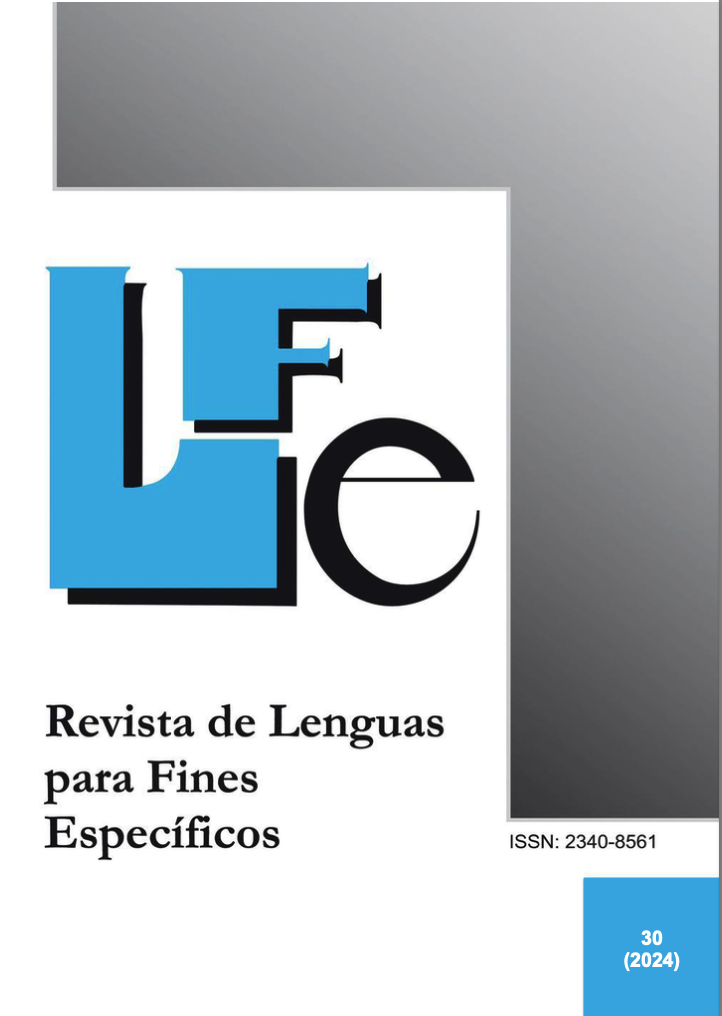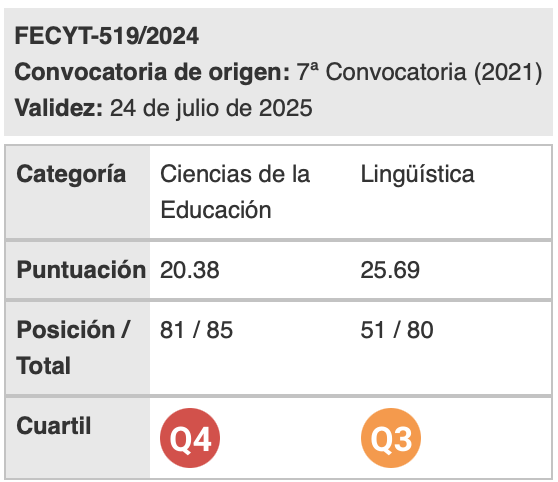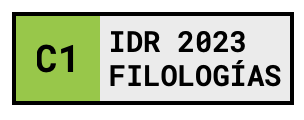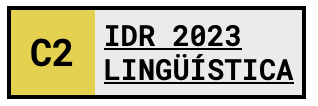Constructing meaning for natural language understanding: completing the English and Spanish complain verbs in the FunGramKB nuclear Ontology
DOI:
https://doi.org/10.20420/rlfe/2024.701Keywords:
FunGramKB, terminal concepts, deep semantics, COREL, verbs of complainAbstract
This article engages with the population process of terminal concepts in the nuclear ontology of FunGramKB. The methodology employed is based on the COHERENT procedure. Our aim is to work on the subontology of #EVENTS by inserting some of the English and Spanish verbs of complain that have not been created yet. Although the basic concept +COMPLAIN_00 is lexicalized by units some units, lexical items such as boast, brag, object, reclamar, and clamar have not been included. These will be subordinates of +SAY_00 and described in COREL language. It is our purpose in this investigation to develop the terminal concepts of $BOAST_00, $DISAGRE_00, $OPPOSE_00, and $DISAPPROVE_00, which will complete the subdomain of complain verbs in these languages.
Downloads
References
Armstrong, S. L., Gleitman, L., and Gleitman, H. (1983). What some concepts might not be. Cognition, 13, 263-308.
Carrión Delgado, M. G. (2012). Extracción y análisis de unidades léxico-conceptuales del dominio jurídico: un acercamiento metodológico desde FunGramKB, RaeL, 11, 25-39.
Cortés Rodríguez, F. J. (2016). Towards the computational implementation of Role and Reference Grammar: Rules for the syntactic parsing of RRG Phrasal constituents. Círculo de lingüística aplicada a la comunicación, 65, 75-108.
Cortés Rodríguez, F. J., and Mairal-Usón, R. (2016). Building an RRG computational grammar. Onomázein, 34, 86-117.
Díaz Galán, A., and Fumero Pérez, M. C. (2016). Developing Parsing Rules within ARTEMIS: The case of Do Auxiliary Insertion. In Periñán-Pascual, C., and Mestre Mestre, E. (eds.), Understanding Meaning and Knowledge Representation. (pp. 283-303). Cambridge Scholar Publishing.
Díaz Galán, A., and Fumero Pérez, M. C. (2017). ARTEMIS: State of the Art and Future Horizons. Revista de Lenguas para Fines Específicos, 23(2), 16-40.
Dixon, R. M. W. (1991). A New Approach to English Grammar on Semantic Principles. Clarendon Press.
Felices Lago, A. (2015) “Foundational considerations for the development of the Globalcrimeterm subontology: a research project based on FunGramKB”. Onomázein, 31, 127-144.
Felices-Lago, A., and Gómez-Moreno, P. U. (2014). FunGramKB term extractor: A tool for building terminological ontologies from specialized corpora. In Nolan, B., and Periñán-Pascual, C. (eds.), Language Processing and Grammars: The role of functionally oriented computational models. (pp. 251-270). John Benjamins.
Felices Lago, A., and Gómez-Moreno, P. U. (2020). Conceptualización de entidades terminológicas en una subontología de derecho penal: análisis del concepto superordinado +DRUG_00 en FunGramKB, Revista de Lingüística y Lenguas Aplicadas, 15, 15-25.
Fodor, J.A. (1975). The language of thought. Harvard University Press.
Guerra García, F. (2014). The interaction of non-linguistic and linguistic knowledge in FunGramKB. In Nolan, B., and Periñan-Pascual, C. (eds.), Language Processing and Grammars: The role of functionally oriented computational models. (pp. 339-366). John Benjamins.
Guerra García, F., and Sacramento Lechado, E. (2014). Exploring the thematic-frame mapping in FunGramKB. In Nolan, B., and Periñan-Pascual, C. (eds.), Language Processing and Grammars: The role of functionally oriented computational models. (pp. 233-250). John Benjamins.
Goddard, C., and Wierzbicka, A. (2002). Meaning and Universal Grammar. Theory and empirical findings: Volume I. John Benjamins.
Halliday, M. A. K. (1985). An Introduction to Functional Grammar. Arnold.
Hernández Hernández, E., and Fumero-Pérez, M. C. (2021). Población de conceptos terminales en la Ontología de Eventos y Entidades en FunGramKB. In Herrera Santana, J. L., and Díaz-Galán, A. (eds.), Aportaciones al estudio de las lenguas: perspectivas teóricas y aplicadas. (pp. 203-2018). Peter Lang.
Jiménez Briones, R., and Luzondo Oyón, A. (2011). Building ontological meaning in a lexico-conceptual knowledge base. Onomázein, 23, 11-40.
Jiménez Briones, R., and Pérez Cabello de Alba, M. B. (2011). An account of selection restrictions in Role and Reference Grammar. Revista Canaria de Estudios Ingleses, 62, 99-122.
Jiménez Briones, R., Luzondo Oyón, A., and Pérez Cabello de Alba, M. B. (2011). “FunGramKB y la organización ontológica”. Anglogermánica Online 2011.
Landau, B. (1982). Will the real grandmother please stand up? The psychological reality of dual meaning representations, Journal of Psycholinguistic Research 11(1), pp. 47-62.
Levin, B. (1993). English verb classes and alternations: a preliminary investigation. The University of Chicago Press.
Mairal Usón, R., and Periñán Pascual, C. (2009a). The anatomy of the lexicon component within the framework of a conceptual knowledge base. Revista Española de Lingüística Aplicada, 22, 217-244.
Mairal Usón, R., and Periñán Pascual, C. (2009b). Role and Reference Grammar and ontological engineering. In Cifuentes, J. L., Gómez, A., Lillo, Mateo, J., and Yus, F. (eds.), Los caminos de la lengua. Estudios en homenaje a Homenaje a Enrique Alcaraz Varó. (pp. 649-665). Universidad de Alicante, Servicio de Publicaciones.
Mairal Usón, R., and Periñán Pascual, C. (2010). Teoría lingüística y representación del conocimiento: una discusión preliminar. In García Padrón, D., and Fumero Pérez, M. C. (eds.), Tendencias en lingüística general y aplicada. (pp. 155-168). Peter Lang.
Mairal Usón, R., and Periñán Pascual, C. (2016). Representing constructional schemata in FunGramKB Grammaticon. In Fleischhauer, J., Latrouite, A., and Osswald, R. (eds.), Explorations of the syntax-semantics interface. (pp. 77-108). Düsseldorf University Press.
Mairal Usón, R., and Ruiz de Mendoza Ibáñez, F. J. (2008). New challenges for lexical representation within the lexical-constructional model. Revista Canaria de Estudios Ingleses, 55, 137-158.
Mairal Usón, R., and Ruiz de Mendoza Ibáñez, F. J. (2009). Levels of description and explanation in meaning construction. In Butler, C., y Martín, J. (eds.), Deconstructing construction. (pp. 153-198). John Benjamins Publishing.
Osherson, D., and Smith, E. (1981). On the adequacy of Prototype Theory as a theory of concepts. Cognition, 9, 35-58.
Periñán Pascual, C. (2015). The underpinnings of a composite measure for automatic term extraction: the case of SRC. Terminology, 21(2), 151-179.
Periñán-Pascual, C. (2018). DEXTER: A workbench for automatic term extraction with specialized corpora. Natural Language Engineering, 24(2), 163-198.
Periñán Pascual, C., and Arcas Túnez, F. (2007). Cognitive modules of an NLP knowledge base for language understanding. Procesamiento del Lenguaje Natural, 39, 197-204.
Periñán Pascual, C., and Arcas Túnez, F. (2010). Ontological commitments in FunGramKB. Procesamiento del Lenguaje Natural, 44, 27-34.
Periñán Pascual, C., and Arcas Túnez, F. (2011). Introducción a FunGramKB. Anglogermánica Online 2011.
Periñán Pascual, C., and Mairal Usón, R. (2009). Bringing Role and Reference Grammar to natural language understanding. Procesamiento del Lenguaje Natural, 43, 265-273.
Periñán Pascual, C., and Mairal Usón, R. (2010). La gramática de COREL: un lenguaje de representación conceptual. Onomázein, 21, 11-45.
Periñán Pascual, C., and Mairal Usón, R. (2011). The COHERENT methodology in FunGramKB. Onomázein, 24, 13-33.
Periñán-Pascual, C., and Mairal Usón, R. (2018) “A framework of analysis for the evaluation of automatic term extractors”. VIAL - Vigo International Journal of Applied Linguistics, 15, 105-125.
Ruiz de Mendoza Ibáñez, F. J., and Mairal Usón, R. (2008). Levels of description and constraining factors in meaning construction: an introduction to the Lexical Constructional Model. Folia Linguistica, 42(2), 355-400.
San Martín, A., and Faber, P. (2014). Deep semantic representation in a domain-specific ontology: Linking EcoLexicon to FunGramKB. In Nolan, B., and Periñan-Pascual, C. (eds.), Language Processing and Grammars: The role of functionally oriented computational models. (pp. 271-296). John Benjamins.
Van Valin, R. D., Jr. (2005). Exploring the syntax-semantics interface. Cambridge University Press.
Van Valin, R. D., Jr., and LaPolla, Randy J. (1997). Syntax. Structure, meaning, and function. Cambridge University Press.
Downloads
Published
How to Cite
Issue
Section
License
Copyright (c) 2024 Federico José Martín-Padrón

This work is licensed under a Creative Commons Attribution-NonCommercial-NoDerivatives 4.0 International License.
Authors who publish with this journal agree to the following terms:
- Authors retain copyright and grant the journal right of first publication with the work simultaneously licensed under a Creative Commons Attribution License that allows others to share the work with an acknowledgement of the work's authorship and initial publication in this journal.
- Authors are able to enter into separate, additional contractual arrangements for the non-exclusive distribution of the journal's published version of the work (e.g., post it to an institutional repository or publish it in a book), with an acknowledgement of its initial publication in this journal.
- Authors are permitted and encouraged to post their work online (e.g., in institutional repositories or on their website) prior to and during the submission process, as it can lead to productive exchanges, as well as earlier and greater citation of published work (See The Effect of Open Access).

Revista de Lenguas para fines específicos is licensed under a Creative Commons Reconocimiento-NoComercial-SinObraDerivada 4.0 Internacional License.

























